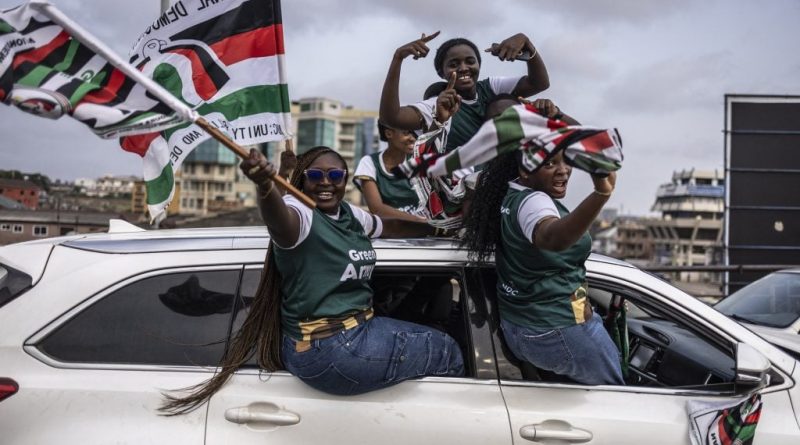Key Challenges Confronting Ghana’s Upcoming Election
Ghana is set to conduct general elections on December 7, where citizens will elect both a president and parliamentary members. Around 18.8 million citizens are registered to engage in this electoral process.
The political landscape in Ghana is dominated by two main parties: the New Patriotic Party (NPP) and the National Democratic Congress (NDC). This two-party system creates a highly competitive environment. The latest polls show Vice President Mahamudu Bawumia and former President John Mahama as the leading candidates.
Bawumia has been serving as Vice President for eight years under Nana Akufo-Addo, who is unable to run for re-election due to term limits. On the other hand, Mahama was president for four-and-a-half years starting in 2012 before losing the 2016 elections.
Other key contenders include notable businessman Nana Kwame Bediako and Alan Kyerematen, a former Minister of Trade and Industry who exited the NPP last year.
Regarded as a model of democracy in Africa, Ghana has a strong reputation for electoral integrity, marked by peaceful transitions of power since the return to multiparty democracy in 1992. Based on historical trends, election results are expected to be announced by December 10.
Alex Vines, director of the Africa programme at Chatham House, observes that the election outcome remains uncertain.
“This election is expected to be highly competitive. Earlier this year, I believed the NDC would have a straightforward victory. Now, I’m not so sure; a presidential runoff could occur, and although the NDC may perform well in parliamentary seats, the NPP could win the presidency. Until Ghanaians cast their votes, everything is speculative,” he stated.
Economy at the center of debate
The forthcoming elections in Ghana have highlighted several pressing issues, particularly around economic management, as voters express heightened concerns regarding inflation, rising unemployment, escalating living costs, frequent power outages, and national debt.
Naidoo points out that a mix of long-term challenges, such as excessive borrowing and public expenditure, which led to Ghana’s 2022 default, together with global disruptions, have compounded financial difficulties, plummeting international reserves, soaring inflation, and a depreciating cedi. He notes that declining commodity prices, impacting the cocoa and oil industries, worsened by hyperinflation at the end of 2022, have left many Ghanaians feeling “exhausted.”
In May 2023, the IMF approved a 36-month extended credit facility for Ghana valued at about $3 billion, which will remain in effect until 2026. Recently, the IMF completed the third review of the program, enabling an immediate disbursement of approximately $360 million.
As the program undergoes regular reviews, it may adjust based on election outcomes, yet both parties will likely have to adhere to its financial constraints.
Given these limitations, the political parties are striving to distinguish their platforms. Political analyst Jervin Naidoo from Oxford Economics Africa indicates that Mahama’s NDC intends to increase public spending in social sectors, while Bawumia’s NPP focuses on enhancing economic stability through reduced inflation and encouraging private sector investment.
“In terms of immediate demands and economic effects, significant changes are improbable because Ghana’s fiscal policy is bound by the IMF program,” Naidoo explains.
Bright Simons, a Ghanaian innovator, entrepreneur, writer, and commentator, tells African Business that the electorate’s focus on urgent matters discourages parties from making bold promises for extensive reforms.
A challenging journey ahead
The principal challenge remains inflation. Consumer prices have risen in the past three months, showing a year-on-year increase of 23% in November, up from 22.1% in October, primarily due to the climbing costs of essential food items.
The depreciation of the cedi also poses a significant hurdle. The currency has weakened considerably against the US dollar due to economic pressures from the Covid-19 pandemic, further exacerbated in 2022 when Ghana defaulted on a substantial portion of its external debt.
Since early 2020, the US dollar has appreciated nearly 180% against the Ghanaian cedi, which currently trades around 15 to the dollar, up from 11 in May 2023.
Addressing these issues—while collaborating with the IMF to reform the economy and attract investments—will be a monumental challenge for the next administration, according to Vines.
“The new government will encounter a substantial challenge in reforming the Ghanaian economy and attracting new investments for sustainable growth. Politicians often overpromise while underestimating the tough decisions that lie ahead; this is a common pattern in democratic elections. Their commitments need to be scrutinized critically.”



